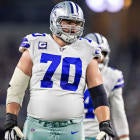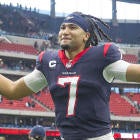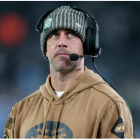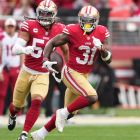Cowboys owner Jerry Jones has exercised fiscal restraint over the last couple of years. Things are about to change in Dallas during the upcoming offseason. His check book is going to open wide.
Jones announced his intention to give quarterback Dak Prescott a new deal hours after a home loss to the Titans on "Monday Night Football'' earlier this month. The 2016 fourth-round pick becomes eligible for a contract extension once the regular season ends on December 30. Signing wide receiver Amari Cooper, who was acquired from the Raiders for a 2019 first-round pick as the late October trading deadline approached, to a new contract reportedly is an offseason priority. Pro Bowl defensive end Demarcus Lawrence also has an expiring contract.
The increased spending will be both by choice and out of necessity. The NFL Collective Bargaining Agreement (CBA) requires each team to spend 89 percent of the salary cap in cash over the four year period of 2017 through 2020. The Cowboys rank 31st in the NFL in spending during the 2017 and 2018 league years at just under $293.5 million according to NFLPA data. The $293.5 million has Dallas below the 89 percent threshold. Spending is 85.3 percent as the halfway mark of the period approaches. The league wide average for team spending in this period is close to 20 percent higher at nearly $350 million.
Dallas is projected to have approximately $50 million of salary cap room next year assuming the 2019 salary cap is set in the $190 million neighborhood. This is using offseason cap accounting rules where only the top 51 cap numbers matter. Carrying over the almost $12.3 of existing cap space as well as the salaries for 2016 draft picks Prescott, defensive end Maliek Collins and cornerback Anthony Brown escalating to the lowest 2019 restricted free-agent tender, which should be slightly more than $2 million, have been factored into the equation.
Jones has an uncanny knack for making gratuitous comments that could potentially cost him money. Curiously, Jones proclaimed prior to a game against the Falcons a couple of weeks ago that he wouldn't consider trading Prescott for two first round picks even if the top spot in the 2019 NFL Draft was included. Dallas doesn't have a 2019 first round pick because of the Cooper trade.
I used to love to it when teams made statements about clients, like Jones', while I was an agent. I kept a file with extremely favorable comments to use at contract time. It was my equivalent of an unwritten or unspoken Miranda rule. As far as I was concerned, teams had the right to remain silent. Anything overly positive said would be used against them in negotiations. I suspect the same will occur with CAA Sports' Todd France, who is Prescott's agent. France also represents Rams All-Pro defensive lineman Aaron Donald and Chargers pass rusher Joey Bosa. Donald and Bosa have engaged in lengthy holdouts when their respective contract negotiations reached an impasse.
Jones handed France a simple argument on a silver platter with the first round picks comment. France has justification to insist that cost of designating Prescott as a franchise player in 2020 is the appropriate starting point for negotiations because two first round picks is the compensation when a player on a non-exclusive franchise tag signs an offer sheet with another team that isn't matched.
The 2020 non-exclusive quarterback number projects to somewhere between $27 million and $27.5 million if the six to eight percent rate of growth in the salary cap from recent years continues. A second franchise tag in 2021 at a CBA mandated 20 percent increase over the 2020 franchise number would be upwards of $33 million. Considering Prescott's 2019 salary will be approximately $2 million thanks to earning the performance escalator available to third through seventh round picks in the final year of rookie contracts, a $62 million cash flow in the first three years (2019 through 2021) may be an important data point to France in a long term deal.
It wouldn't be surprising for France to suggest that Tony Romo's 2013 extension adjusted to a 2019 salary cap environment could also be a barometer for Prescott's deal since he took Romo's job away from him. Romo signed a signed a six-year, $108 million extension that made him the NFL's fourth highest player when the salary cap was $123 million. The deal had $55 million in guarantees where $40 million was fully guaranteed at signing.
This type of approach would be ignoring that Romo was far more accomplished than Prescott is now when he signed his 2013 deal. If the 2019 salary cap is right around $190 million, an equivalent deal would average a little more than $27.775 million per year. It would have approximately $85 million in guarantees and slightly over $61.75 million fully guaranteed at signing.
A contract at this level isn't warranted based on Prescott's body of work. Prescott's development has stalled since he was named the 2016 NFL Offensive Rookie of the Year after ending Romo's nearly decade long stranglehold on the Cowboys starting quarterback job while he was sidelined several weeks recovering from a back injury. As a rookie, Prescott had the NFL's fourth best completion rate at 67.8 percent and ranked third in league with a 104.9 passer rating. He threw 23 touchdown passes and just four interceptions. The Cowboys secured home field advantage in the NFC through the 2016 season playoffs by winning 13 games.
Nobody is going to confuse Prescott with the game's top young passers, such as Jared Goff (Rams), Patrick Mahomes (Chiefs) and Carson Wentz (Eagles). In the 27 games since Prescott's rookie year, he has completed 63.8 percent of passes (20th in the NFL) for 5,751 yards (18th) with 35 touchdowns (18th) and 18 interceptions (13th most) to post an 89.3 passer rating (20th).
Prescott when asked about his next contract during the offseason indicated he was willing to be flexible if it allowed the Cowboys to keep other core players. It's hard to imagine France giving the Cowboys any type of break on a contract without Prescott's insistence. Prescott not having made any significant NFL money could cut in Jones' favor. His career earnings from his NFL contract after this season will be just over $2 million.
Cooper has had an instant impact on the Cowboys while getting acclimated to a new offense in his four games since the trade. He has 22 receptions, 349 yards and three touchdowns with the Cowboys. Dallas is on a three-game winning streak, which will be put to the test against the 10-1 Saints on Thursday night, to raise their record to 6-5 and now control their own destiny in a weak NFC East.
Cooper is the legitimate receiving threat Prescott had been sorely missing this season. His presence has helped changed the way the opposition defends the Cowboys. It isn't a coincidence that All-Pro running back Ezekiel Elliott has topped 120 rushing yards in each of the last three games, which is something he hasn't done since early in the 2016 season as a rookie.
Jones declared Cooper was "making a bid for his cash" after catching eight passes for 180 yards and scoring two touchdowns against the Redskins on Thanksgiving. It was the most receiving yards by a Cowboys wide receiver since Dez Bryant's 224 in 2012. Cooper's effort earned him NFC Offensive Player of the Week honors.
Joel Segal will likely drive an extremely hard bargain for Cooper, who is under contract in 2019 for $13.924 million thanks to Oakland exercising its option for a fifth year in April. Segal made Bears edge rusher Khalil Mack the NFL's highest paid non-quarterback at $23.5 million per year on the six-year extension containing $90 million of guarantees he negotiated in conjunction with his client's trade from the Raiders on Labor Day weekend. More impressively, Segal got the Rams to grossly overpay wide receiver Tavon Austin, a current Cowboys backup, on a four-year extension in 2016 averaging approximately $10.5 million per year with two years remaining on his rookie contract.
Dallas' pursuit of wide receiver Sammy Watkins in offseason free agency sets a salary floor for Cooper. Watkins signed a three-year contract with the Chiefs averaging $16 million per year and containing $30 million fully guaranteed. Cooper getting a deal comparable to the $18 million per year extension Odell Beckham, Jr. signed with the Giants during the preseason, which made him the NFL's highest paid wide receiver, isn't out of the realm of possibility. Beckham has a wide receiver record $65 million in guarantees where $40.959 million was fully guaranteed at signing.
Chiefs wide receiver Tyreek Hill and/or Saints wide receiver Michael Thomas, who will be entering contract years in the offseason, could eclipse the Beckham deal next year with their own extensions. Julio Jones, who was promised a new deal by the Falcons in 2019 when a slight adjustment was made to his existing contract right before training camp started, should surpass Beckham's $18 million average per year.
It will cost a minimum of $16,708,800, which is 20 percent more than Cooper's option year salary, to give him a franchise tag in 2020. The actual amount is likely to be in excess of $18 million based on the formula in the CBA to calculate non-exclusive franchise numbers provided the 2020 salary cap is above $200 million.
Lawrence is proving his 2017 breakout season in which he was selected to the Pro Bowl for the first time while tying for second in the NFL with 14.5 sacks isn't a fluke. He is demonstrating that he is the "war daddy" pass rusher Cowboys owner Jerry Jones has been looking for since releasing future Hall of Famer DeMarcus Ware in 2014.
Lawrence is on pace for a 13 sack season. He is third in the NFL in sacks dating back to the start of the 2017 season with 23 in 27 games. According to Pro Football Focus (PFF), Lawrence is tied with Broncos outside linebacker and Super Bowl 50 MVP Von Miller for the NFL's second most quarterback pressures (combined sacks, quarterback hurries and quarterback hits) since the beginning of last season with 124.
Lawrence is putting himself in a position to capitalize on his great attitude about playing this season under a $17.143 million franchise tag. He views the tag as an opportunity to break the bank in 2019 since the Cowboys were content to let the mid-July deadline for franchise players to sign long term deals pass without reaching an agreement with him. By CBA rule, the Cowboys are precluded from signing Lawrence long term until the regular season ends. Lawrence has been adamant about not playing under a tag two years in a row although a second designation in 2019 will be $20,571,600 with the CBA's required 20 percent increase from his current number. The Cowboys making Cooper more a signing priority won't sit well with Lawrence.
The five-year, $85 million contract with $52.5 million in guarantees the Giants gave Olivier Vernon during 2016 free agency after factoring in salary cap inflation could have significance because Lawrence is represented by David Canter, who negotiated the deal. A comparable deal to Vernon's would average a little more than $20.75 million per year with the expected 2019 salary cap increase. Reaching Miller's $70 million of overall guarantees and Donald's $50 million fully guaranteed may be necessary.
The Cowboys have taken a conservative approach to free agency in recent years although a run was made at Watkins before he signed with Chiefs. The last big free agent signing was cornerback Brandon Carr in 2012.
Thomas hit the ground running when he ended his holdout a few days before the regular season started because his "pay me or trade me" ultimatum to the Seahawks fell on deaf ears. He had emerged as a Defensive Player of the Year candidate before fracturing his left leg, the same one he broke two years ago, in a Week 4 contest against the Cardinals. Thomas was tied for the NFL lead with three interceptions when he got hurt. The break is expected close the chapter on the Seahawks portion of the five-time All-Pro's career.
Thomas, who turns 30 in May, should have a clean bill of health or close to it when free agency starts next March. The injury is unlikely to change Thomas' asking price during the offseason. An injury-plagued year or a season ending injury in a contract year used to be the kiss of death for most players entering free agency. Teams aren't penalizing injured players on the open market as severely anymore.
Thomas' current deal, which averages $10 million per year, made him the NFL's highest paid safety when signed in 2014. He is expected to try to reclaim his place at the top of the safety pay scale. Eric Berry is the current benchmark with the six-year, $78 million contract containing $40 million in guarantees he received from the Chiefs in 2017 when he was 28.
Thomas' next contract may be affected more structurally than financially despite his age, with teams beginning to take a more enlightened approach toward injured free agents. Topping Berry's $40 million in overall guarantees seems less likely than his $13 million average yearly salary.
It's widely known that Thomas' preference is to play for the Cowboys. The Texas native created a bit of a stir by lobbying Cowboys head coach Jason Garrett to either trade for him or sign him if he ever hits free agency after a game between the two teams late last season. Thomas had a great audition this season against Dallas by picking off two of Prescott's passes. Kris Richard, who was Seattle's defensive coordinator the last three seasons, is the Cowboys' secondary coach. The Cowboys dragging their feet in free agency or not making an offer that's competitive with other teams could prompt Thomas to sign elsewhere although he wants to be in Dallas.
The fourth overall pick in the 2016 NFL Draft is also eligible for a new contract at the conclusion of the regular season. The Cowboys aren't strangers to rewarding first round picks early. Offensive tackle Tyron Smith and center Travis Frederick were made the highest paid players at their respective positions after their third NFL seasons.
Rams running back Todd Gurley is the only 2015 first-round pick to receive an extension on the same timeframe as Smith and Frederick. Gurley dramatically re-set the running back market with the four-year, $57.5 million extension (worth a maximum of $60 million through realistically achievable salary escalators) he signed in late July. His $45 million in guarantees are the most ever in a running back contract. David Johnson helped solidify the market by accepting a three-year, $39 million extension with $31,882,500 of guarantees hours before the Cardinals' regular season opener. Johnson's deal is worth a maximum of $45 million through incentives.
The Cowboys are surely going to exercise their option for a fifth year with Elliott in 2020. Elliot's option year salary will be $9.186 million with a $190 million 2019 salary cap. He will likely want a contract comparable to or more than Gurley's.
Elliott's situation is more complicated than Smith or Frederick's. The 2016 first team All-Pro is accumulating mileage at an almost unprecedented rate. He is averaging 21.69 carries a game in the NFL (781 rushing attempts in 36 games). Only three running backs in NFL history have had a higher usage rate during their first three seasons. Edgerrin James, Eric Dickerson and Earl Campbell are at 23.87, 23.06 and 22.67 carries per game.
Elliott's workload has increased this season because of a bigger role in the passing game. He is on pace for a career high 384 touches (combined rushing attempts and receptions). Elliott is leading the NFL with 217 rushing attempts and 264 touches. He won the rushing title in 2016 as a rookie. Elliott is on track to lead the league in rushing again.
The Cowboys were unwilling to make a substantial commitment to DeMarco Murray after an outstanding contract year in 2014 in which he was named the NFL's Offensive Player of the Year. Murray broke Emmitt Smith's single season franchise rushing record by gaining 1,845 yards on the ground on 392 carries. It was the eighth most rushing attempts ever in an NFL regular season. Murray had another 44 carries in the playoffs to bring his total to 436 carries. He also broke Jim Brown's 56-year-old NFL record of six consecutive games with 100 rushing yards or more to begin a season with an eight game streak.
There were concerns about Murray's future productivity because of how running backs performed historically after a season with an extremely heavy workload. The Cowboys belief that Murray benefitted from running behind a great offensive line was another mitigating factor.
It remains to be seen whether the Murray standards will apply to Elliott with sustained heavy usage. The six-game suspension Elliott served last season under the personal conduct policy because of domestic violence accusations could also be a cause for concern.
Jones has thrived in moving to cornerback full-time from free safety. He is the darling of PFF. Jones was selected to PFF's Midseason All-Pro team. He is PFF's highest ranked cornerback this season. According to PFF metrics, opposing quarterbacks are completing 50 percent of passes (23 of 46) when targeting Jones for a 67.4 passer rating.
Jones's 2019 fifth-year option is currently valued at $6.626 million. It is probably going to increase to $9.069 million because of his move to cornerback.
The going rate for high level cornerbacks is $14 million to $15 million per year with over $40 million in guarantees where at least $30 million is fully guaranteed at signing. The 2020 cornerback franchise number is probably going to exceed $16.5 million with continued salary cap growth.
Final Thoughts
The Cowboys have a little more flexibility with the timing of signings since 2020 is the final year of the CBA. A franchise and transition designation can be used in 2020 instead of one or the other like in other years under the CBA. Nonetheless, it makes sense for Dallas to proceed as only one designation can be used where either Prescott or Cooper must be signed to an extension in 2019. Getting one or both signed would leave Jones as a prime candidate for either designation in 2020.
The patience Jones has been exercising with Lawrence probably should apply to Prescott unless he is willing to give the Cowboys a steep hometown discount. Jones doesn't seem inclined to wait although the 2019 season could be used to evaluate whether Prescott is actually the long-term solution at quarterback knowing that he could be franchised in 2020 if necessary.
The Cowboys should also seriously consider taking a cautious approach with Elliott's contract given that his extremely heavy workload is unlikely to change over the next couple of years barring injury. Letting him play out his option year and franchising him until it's impractical while finding his successor in the 2021 or 2022 draft may be the most prudent course of action given the shorter shelf life of running backs especially when there is constant heavy usage. Trying to replicate the triplets concepts of the 1990s starring quarterback Troy Aikman, running back Emmitt Smith and wide receiver Michael Irvin, which produced three Super Bowl victories, substituting Prescott, Elliott and Cooper in their place seems more likely than proceeding with caution at running back.
Dallas doesn't run the risk of getting back into salary cap hell like in the early part of the decade and the late 1990s with a massive spending spree in the offseason. There are just under $74.5 million of cap commitments in 2020. Only two teams, the Bills and Jets, currently have fewer 2020 cap obligations. Even if the cap starts becoming tight, the Cowboys have consistently been willing to aggressively manage the cap where multiple contracts are restructured to free up space.



























